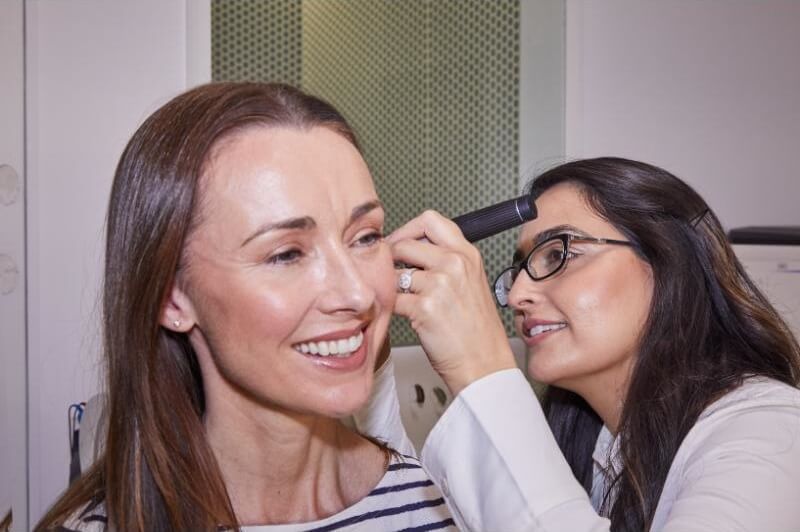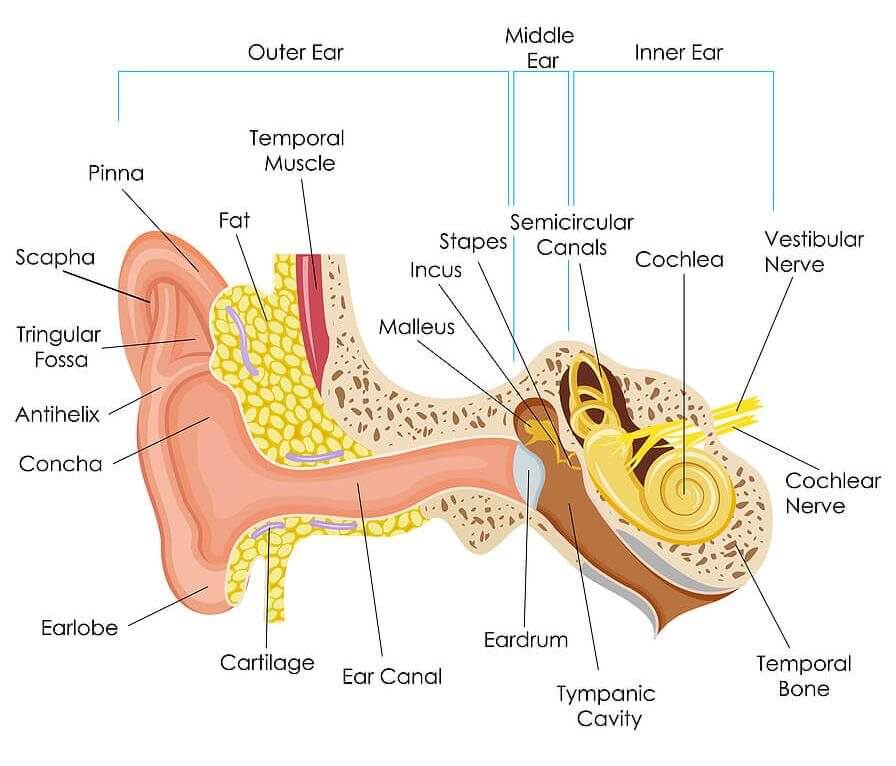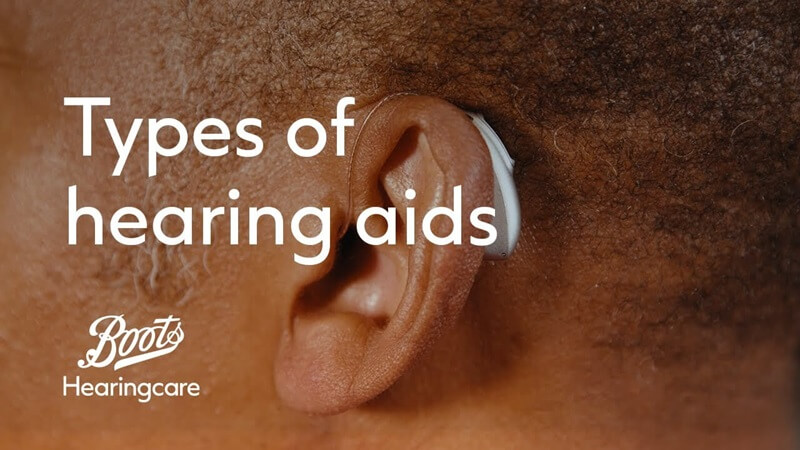Conductive
Description - It occurs when sound waves cannot pass through the outer or middle ear to the inner ear.
Causes - Ear infections, fluid in the middle ear, earwax buildup, perforated eardrum, abnormal bone growth in the middle ear.
Loss of hearing can be very concerning. To help you hear better for longer, we've created some helpful advice on the main causes of hearing loss and the potential signs to look out for. If you've noticed a change in your hearing, it's important to book a free hearing health check with one of our trained professionals, who will be happy to help.
Book a free hearing test
Understanding the causes of hearing loss is crucial for effective management and treatment. These factors can contribute to changes in auditory ability:
Common causes of hearing loss include:
• Age: the likelihood of experiencing auditory changes increases with age, particularly after 60. Noise exposure: regular exposure to loud sounds, like concerts without ear protection, can impact hearing.
• Ear infections: infections in the ear can lead to temporary or permanent hearing issues.
• Perforated eardrum: a burst eardrum can result in hearing complications.
• Ménière’s disease: this inner ear disorder may affect hearing and balance.
• Family history: genetic factors can contribute to hearing challenges.
• Build-up of earwax: accumulation of earwax can block the ear canal and impair hearing.
Consulting with your doctor on any of the above factors can help guide hearing loss treatment and create a management plan tailored to your needs.

Understanding the different types of hearing loss can help identify the underlying causes and appropriate treatments. Here’s a brief overview presented in a table for clarity:

Hearing changes often occur gradually, and it's common for individuals to live with symptoms unknowingly. Staying vigilant to the prevalent signs can prevent unnecessary challenges for both you and your loved ones.
Things to look out for include:
• Difficulty hearing clear: struggling to hear others distinctly.
• Phone hearing challenges: difficulty hearing during phone conversations.
• Speech misunderstanding: trouble understanding speech, especially in noisy environments.
• Frequent repetition: asking others to repeat themselves.
• Volume adjustment: increasing TV volume significantly.
• Social withdrawal: pulling back from conversations.
• Reluctance to socialise: hesitancy in social engagements.
Understanding the impact of everyday noises on your hearing is crucial for maintaining good ear health. Here are some examples of common sounds and their corresponding decibel levels:
Prolonged exposure to noises above 85 dB can potentially cause hearing damage. It's essential to be aware of these levels to protect your hearing. For more information on how hearing works and how to protect it, we give a detailed breakdown on how we hear.
As we age, auditory changes can occur, but proactive steps can help mitigate the impact. Consider these preventive measures:
• Limit exposure to loud noises: avoid prolonged exposure to loud sounds. If you work in a noisy environment, use hearing protection to reduce the risk of hearing loss.
• Keep headphone volume at a moderate level: listening to music or other audio at high volumes can damage your hearing. Keep the volume at a safe level, especially when using headphones.
• Use earplugs or protective earmuffs in noisy environments: whether you're at a concert, using power tools, or attending a sporting event, earplugs or earmuffs can help protect your ears from harmful noise levels.
• Opt for quieter products and settings: choose appliances and equipment designed to operate more quietly. When possible, select quieter recreational activities that don't expose you to excessive noise.
• Regularly undergo hearing tests: schedule regular hearing check-ups to monitor your hearing health. Early detection of hearing loss can lead to more effective management and prevention strategies.
For more detailed and practical advice on protecting your hearing, visit our page on ways to improve your hearing health.
Hearing aids are a valuable tool for managing hearing loss. They amplify sounds to make them easier to hear, improving communication and quality of life. Modern hearing aids come with various features, including noise reduction, directional microphones, and connectivity to other devices, making them effective in different listening environments.
By adopting these preventive measures and staying informed, you can significantly contribute to maintaining your hearing health and minimising the risks associated with harmful listening habits.
Treatment for hearing loss depends on its cause. Your GP may diagnose the cause of your hearing loss and provide simple solutions such as ear drops or antibiotics. Below, we outline various treatment options:
Coping with hearing loss can be challenging for individuals and their families. Here are some strategies and tips to help manage this transition:
• Get support: connect with support groups and counselling services to share experiences and gain emotional support.
• Educate yourself and others: learn about hearing loss and its impact. Educating family and friends can foster understanding and patience.
• Use assistive devices: invest in devices such as hearing aids that can significantly improve hearing.
• Develop lip-reading skills: practice lip-reading to enhance communication in noisy environments.
• Face-to-face communication: always try to communicate face-to-face. This helps with lip-reading and picking up visual cues.
• Speak clearly and slowly: encourage others to speak clearly and at a moderate pace without shouting.
• Minimise background noise: reduce background noise during conversations by turning off the TV or moving to a quieter area.
• Use technology: explore hearing assistive technologies like captioned phones, amplified telephones, and personal amplifiers.
• Utilise text and email: when verbal communication is difficult, use text messaging, email, or other written forms of communication.
• Visual alerts: use visual alert systems for important sounds such as doorbells, alarms, or phone calls.
By adopting these strategies and utilising available technologies, individuals with hearing loss and their families can improve communication and enhance their quality of life.
Any kind of hearing loss is scary, but you don’t have to suffer alone. If you have a problem with hearing loss, get help from your doctor or a qualified audiologist.
Do you have any issues related to hearing loss? Arrange a consultation with a specialist at Boots Hearingcare to go through your case.